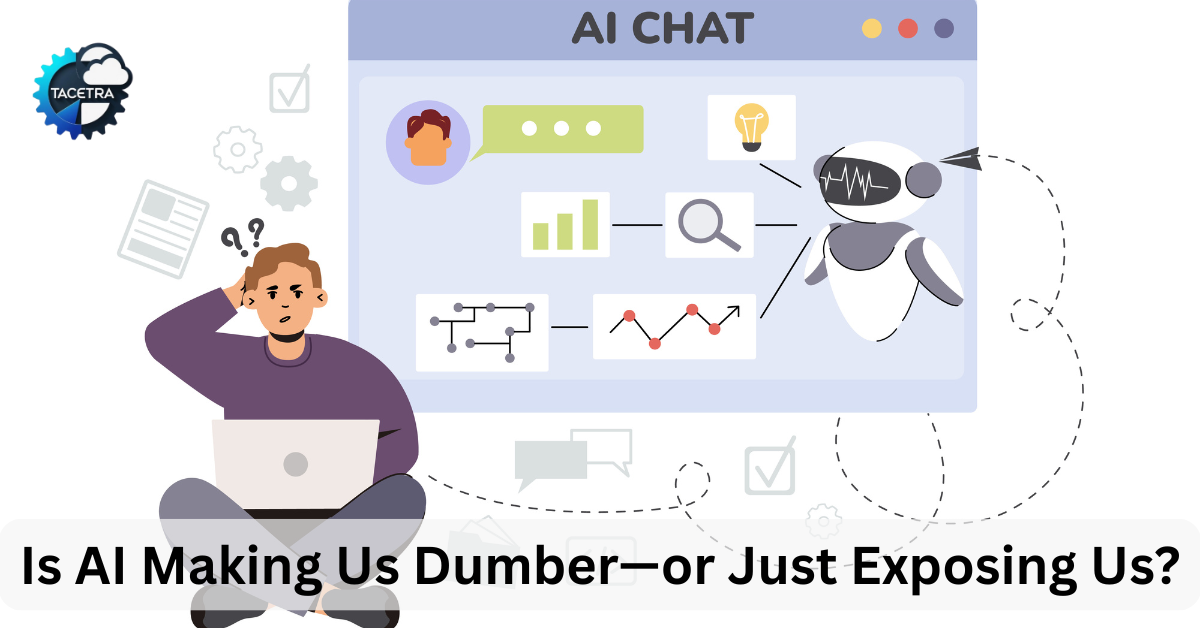A recent Reddit debate caught my attention because it perfectly captured the cultural tension many of us are feeling. The thread—titled “AI is dumbing us down really fast”—wasn’t just another rant. It reflected a genuine fear: that tools like ChatGPT are quietly eroding our ability to think, write, and reason on our own.
As I scrolled through the comments, the underlying anxiety became crystal clear. People are worried that we’re outsourcing our brains, exchanging slow and meaningful cognitive effort for fast, polished answers served on demand by Large Language Models. And according to the original poster, many of their peers now struggle to form basic sentences without running them through an AI model first.
This is the nightmare scenario: not AI replacing jobs—but AI replacing thought. A future where our cognitive muscles atrophy because we stopped using them.
The Real Concern: Are We Losing Mental Strength?
It’s not an unreasonable fear. Human cognition follows a simple principle: use it or lose it. If we consistently hand over the “thinking” part of communication—structuring arguments, analyzing perspectives, choosing the right words—our intellectual resilience weakens.
The temptation to let AI think for us is immense. Under time pressure, with deadlines and expectations mounting, it’s easy to default to “let ChatGPT craft the response.” But if we rely on AI for the heavy lifting, we risk losing the very skills that define independent thought and creativity.
That’s where the concept of AI dependency becomes dangerous. Not because the tool is harmful, but because the way we use it might be.
The Mirror Effect: AI Exposes Weak Thinking—It Doesn’t Create It
But deeper into the Reddit thread, a more nuanced perspective emerged—one that’s both grounding and reassuring.
One commenter said something that stuck with me:
“AI isn’t making people dumb. It’s revealing who wasn’t thinking critically in the first place.”
That hits hard.
For some users, AI is simply a new crutch for old habits—surface-level understanding, weak literacy, lack of confidence in writing. The person who depends on ChatGPT to write a basic email is the same person who would have struggled five years ago without AI. The tool didn’t create the gap; it exposed it.
This mirrors the early Google era.
Google didn’t make people less informed.
But people who relied on the first search result without question certainly made themselves less informed.
AI works the same way: if you accept outputs blindly, you stay shallow. If you interrogate them, edit them, and build on them, you grow deeper.
So perhaps AI isn’t causing cognitive decline—it’s highlighting a pre-existing lack of digital literacy, critical thinking, and intellectual rigor.
AI as a Tool for Human Augmentation
Where I ultimately land is somewhere between concern and optimism: Generative AI becomes dangerous only when we use it passively. Used actively and intentionally, however, it can enhance our thinking, not replace it.
Some of the best counterexamples I saw in the Reddit comments came from people who use AI strategically:
- A teacher who offloads administrative writing to ChatGPT so they can focus on real human work—mentoring students, resolving conflicts, crafting creative lessons.
- Professionals who use AI to analyze drafts, not to generate them.
- Creators who treat AI as a second set of eyes rather than a ghostwriter.
These are people who still originate the thought. AI simply helps them refine it.
That’s the key distinction:
AI should sculpt our ideas, not supply them.
For my own writing, I treat AI like a reflective surface. I draft first, then use the model to spot blind spots, test phrasing, or evaluate clarity. AI helps me sharpen my thinking, but it never replaces the thinking itself.
The Future Depends on How We Choose to Use AI
We’re at an important inflection point. The fear that AI is “dumbing us down” isn’t baseless—but it’s also not guaranteed. The real differentiator isn’t the technology. It’s our behavior.
We can either:
- Let AI think for us, outsourcing the very processes that make us human
or - Use AI to amplify our capabilities, preserving our cognitive independence while unlocking new levels of productivity and insight
The danger of generative AI lies in passive consumption. The opportunity lies in deliberate use.
If we teach the next generation to question outputs, revise them, analyze them, and understand them, we won’t face “brain rot.” We’ll build a generation more capable and cognitively flexible than ever.
The risk of being “dumbed down” is real—but it’s voluntary. AI doesn’t lower intelligence. Misusing AI does.
And choosing not to think is still a choice.
Further Reading: The Software Engineer’s Dilemma: High Pay, High Stress, and the Road to FIRE
Discover more from TACETRA
Subscribe to get the latest posts sent to your email.
